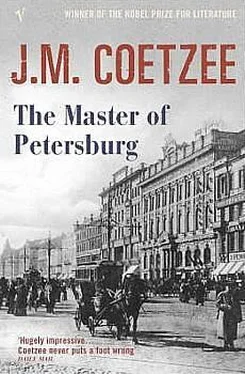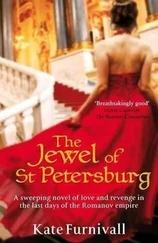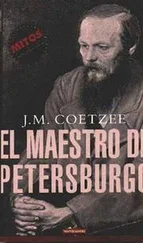'Do you want me to take revenge? Do you want me to go out and betray you? Is that what it is meant to achieve, all this charade of mazes and blindfolds?'
Nechaev laughs excitedly, and he knows that they understand each other. 'Why should I want that?' he replies in a soft, mischievous voice, giving the girl a sidelong glance as if drawing her into the joke. 'I'm not a youth who has lost his way, like your stepson. If you are going to the police, be frank about it. Don't sentimentalize me, don't pretend you are not my enemy. I know about your sentimentalizing. You do it to women too, I'm sure. Women and little girls.' He turns to the girl. 'You know all about it, don't you? How men of that type drop tears when they hurt you, to lubricate their consciences and give themselves thrills.'
For someone of his age, extraordinary how much he has picked up! More even than a woman of the streets, because he has his own shrewdness. He knows about the world. Pavel could have done with more of that. There was more real life in the filthy, waddling old bear in his story – what was his name? Karamzin? – than in the priggish hero he so painfully constructed. Slaughtered too soon – a bad mistake.
'I have no intention of betraying you,' he says wearily. 'Go home to your father. You have a father somewhere in Ivanovo, if I remember. Go to him, kneel, ask him to hide you. He will do it. There are no limits to what a father will do.'
There is a wild snort of laughter from Nechaev. He can no longer remain still: he stalks across the cellar, pushing the children out of his way. 'My father! What do you know about my father? I'm not a ninny like your stepson! I don't cling to people who oppress me! I left my father's house when I was sixteen and I've never been back. Do you know why? Because he beat me. I said, "Beat me once more and you will never see me again." So he beat me and he never saw me again. From that day he ceased to be my father. I am my own father now. I have made myself over. I don't need any father to hide me. If I need to hide, the people will hide me.
'You say there are no limits to what a father will do. Do you know that my father shows my letters to the police? I write to my sisters and he steals the letters and copies them for the police and they pay him. Those are his limits. It shows how desperate the police are, paying for that kind of thing, clutching at straws. Because there is nothing I have done that they can prove – nothing!'
Desperate. Desperate to be betrayed, desperate to find a father to betray him.
'They may not be able to prove anything, but they know and you know and I know that you are not innocent. You have gone further than drawing up lists, haven't you? There is blood on your hands, isn't there? I'm not asking you to confess. Nevertheless, in the most hypothetical of senses, why do you do it?
'Hypothetically? Because if you do not kill you are not taken seriously. It is the only proof of seriousness that counts.'
'But why be taken seriously? Why not be young and carefree as long as you can? There is time enough afterwards to be serious. And spare a thought for those weaker fellows of yours who made the mistake of taking you seriously. Think of your Finnish friend and of what she is going through at this very moment as a consequence.'
'Stop harping on my so-called Finnish friend! She has been looked after, she isn't suffering any more! And don't tell me to wait to be old before I am taken seriously. I have seen what happens when you grow old. When I am old I won't be myself any longer.'
It is an insight he could have imagined coming from Pavel, never from Nechaev. What a waste! 'I wish,' he says, 'I could have heard you and Pavel together.' What he does not say is: Like two swords, two naked swords.
But how clever of Nechaev to have forewarned him against pity! For that is just what he is on the point of feeling: pity for a child alone in the sea, fighting and drowning. So is he wrong to detect something a little too studied in Nechaev's sombre look (for he has, surprisingly, fallen silent), in his ruminative gaze – more than studied, in fact: sly? But when was it last that words could be trusted to travel from heart to heart? An age of acting, this, an age of disguise. Pavel too much of a child, and too old-fashioned, to prosper in it. Pavel's hero and heroine conversing in the funny, stammering, old-fashioned language of the heart. 'I wish… I wish…' – 'You may… You may…' Yet Pavel at least tried to project himself into another breast. Impossible to imagine Sergei Nechaev as a writer. An egoist and worse. A poor lover too, for sure. Without feeling, without sympathy. Immature in his feelings, stalled, like a midget. A man of the future, of the next century, with a monstrous head and monstrous appetites but nothing else. Lonely, lone. His proper place a throne in a bare room. The throne of ideas. A pope of ideas, dull ideas. God save the faithful then, God save the ruled!
His thoughts are interrupted by a clatter on the stairs. Nechaev darts to the door, listens, then goes out. There is a furious whispering, the sound of a key in a lock, silence.
Still wearing her little white hat, the woman has sat down on the edge of the bed with the youngest child at her breast. Meeting his eye, she colours, then lifts her chin defiantly. 'Mr Ishutin says you may be able to help us,' she says.
'Mr Ishutin?'
'Mr Ishutin. Your friend.'
'Why should he have said that? He knows my situation.'
'We're being put out because of the rent. I've paid this month's rent, but I can't pay the back rent too, it's too much.'
The child stops sucking and begins to wriggle. She lets him go; he slithers off her lap and leaves the room. They hear him relieving himself under the stairs, moaning softly as he does so.
'He's been sick for weeks,' she complains. 'Show me your breasts.'
She slips a second button and exposes both breasts. The nipples stand out in the cold. Lifting them up between her fingers, she softly manipulates them. A bead of milk appears.
He has five roubles that he has borrowed from Anna Sergeyevna. He gives her two. She takes the coins without a word and wraps them in a handkerchief.
Nechaev comes back. 'So Sonya has been telling you of her troubles,' he says. 'I thought your landlady might do something for them. She's a generous woman, isn't she? That was what Isaev said.'
'It's out of the question. How can I bring -?'
The girl – can her name really be Sonya? – looks away in embarrassment. Her dress, which is of a cheap floral material quite inappropriate to winter, buttons all the way down the front. She has begun to shiver.
'We'll talk about that later,' says Nechaev. 'I want to show you the press.'
'I am not interested in your press.'
But Nechaev has him by the arm and is half-steering, half-dragging him to the door. Again he is surprised by his own passivity. It is as though he is in a moral trance. What would Pavel think, to see him being used thus by his murderer? Or is it in fact Pavel who is leading him?
He recognizes the press at once, the same old-fashioned Albion-of-Birmingham model that his brother kept for running off handbills and advertisements. No question of thousands of copies – two hundred an hour at most.
'The source of every writer's power,' says Nechaev, giving the machine a slap. 'Your statement will be distributed to the cells tonight and on the streets tomorrow. Or, if you prefer, we can hold it up till you are across the border. If ever you are taxed with it, you can say it was a forgery. It won't matter by then – it will have had its effect.'
There is another man in the room, older than Nechaev – a spare, dark-haired man with a sallow complexion and rather lustreless dark eyes, stooped over the composing table with his chin on his hands. He pays no attention to them, nor does Nechaev introduce him.
Читать дальше












